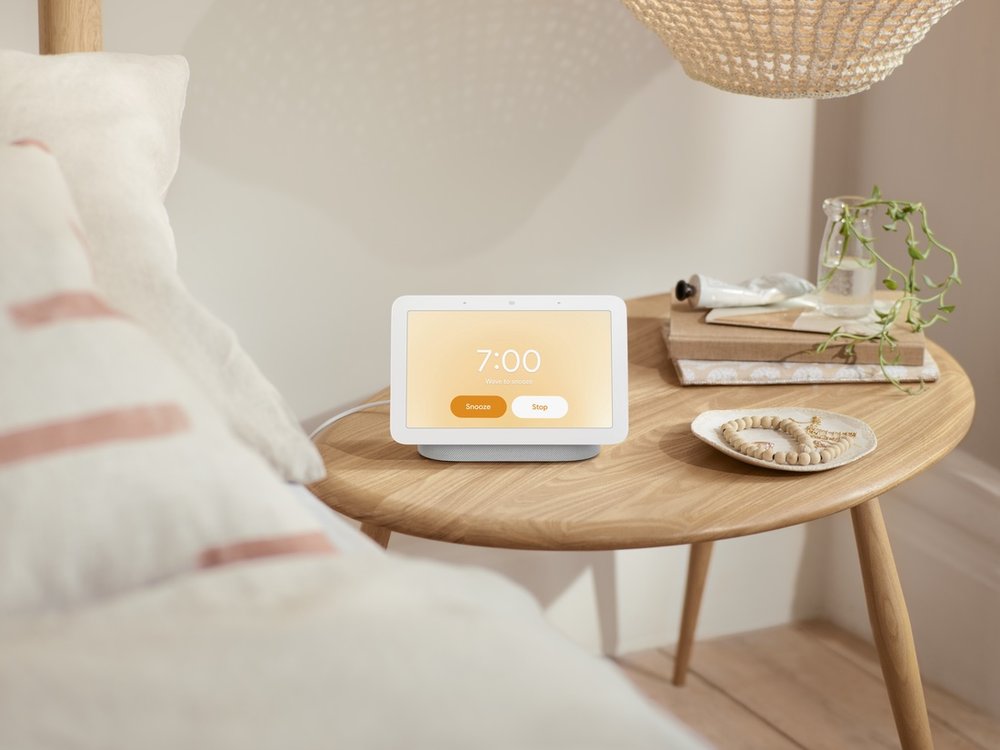As the days get shorter and colder, it’s getting much harder for us to step out from under our bed covers and into the dark morning. When Daylight Saving Time ends this weekend in Europe and the weekend after in North America, we’ll need to adjust ourselves even more. So, what’s the best way to deal with the new sleeping schedule?
The Nest team spoke to Dr. Logan Schneider who gave us five tips to get your winter sleep schedule ready. Originally a sleep scientist at Stanford Medicine, Logan is now the sleep expert at Google Health. He’s also the brain behind Sleep Sensing on the new Google Nest Hub, the smart screen that helps you get a better night’s sleep.
Start adjusting on time… or don’t adjust at all
That extra hour of sleep this weekend can feel like jet lag for some. Soon, your sleep rhythm might make you want to go to bed earlier than usual. Logan’s advice is to start preparing a few days in advance to make the transition easier for your body. Dr. Logan says: “Rather than shifting your bedtime and wake time by an hour at once, you could try shifting them over four days, so that’s by 15 minutes a day. Start two days before the clocks change, and wrap up two days after.”
The time change can be even more dreadful for kids and their parents. Dr. Logan applies the same principles to kids as above, but makes the night of the time change extra fun: “I allow my kids to wake up 15 minutes later on the Friday before the time change, and again on Saturday morning. On Saturday night, the kids get to stay up an hour later than usual. I make sure we’re watching a movie in a bright light environment, because that helps push the clock a bit later. They wake up at the usual time on Sunday.”
For adults, there might be an even better way: why adjust to the new schedule at all? “You could simply take advantage of being an early bird and just stay on the earlier schedule”, Logan says. Nest Hub with Sleep Sensing can help you monitor your sleep schedule and provide a new bedtime and wake time recommendation after the transition.
Find your perfect room temperature
People often think that a cool room (16-19˚C or 61-66˚F) is better for sleeping, but according to Dr. Logan, there is no one-size-fits-all temperature in the bedroom. He recommends finding a temperature that is comfortable for you throughout the night. An uncomfortably cold or warm bedroom can affect the quality of your REM sleep, which is an important phase of your night’s rest.
Nest Hub keeps track of the average temperature at night. Did you sleep well? Great! Take note of the temperature that Nest Hub measured for you on the Sleep Quality page and make sure that your bedroom is set to that temperature from now on.
Embrace the winter cold once you wake up
We’ve all been there: the alarm goes off, your eyes won’t open and the thought of walking in the cold to the bathroom makes you want to stay in bed even more. However, embracing a cold winter’s day is actually a good idea.
Dr. Logan says: “The cold can serve as a cue to your body that it’s time to wake up. So, while you may not want to leave your cozy bed, walking around on a cool floor or washing your face with cold water can be just the invigorating experience your body needs to get going in the morning.”
Never snooze again
As the saying goes: You snooze, you lose. Dr. Logan says: “When using the snooze function, not only are you delaying the inevitable, you’re also not using the extra time well. Falling back to sleep after an alarm takes time. Between each ring of the alarm you’re not getting as much sleep as you think. Your brain can spend up to half of the time falling back to sleep!”
In short, your snoozy nap isn’t really that helpful. It’s better to get up immediately when your alarm goes off.
Imitate a sunrise
Humans are naturally accustomed to waking up to sunlight. Yet, in the winter months, waking up during a dark morning might feel like waking up in the middle of the night. Light plays a key role in your sleep rhythm, says Dr. Logan: “It’s important to use light to help wake up, because your body relies on exposure to light when you’re waking up to set its internal clock for the next sleep period.”

Fortunately, Nest Hub’s Sunrise Alarm helps you wake up from your deepest sleep peacefully. It gradually brightens up the screen, just like a sunrise, and then slowly increases the alarm volume. Good morning sunshine!










